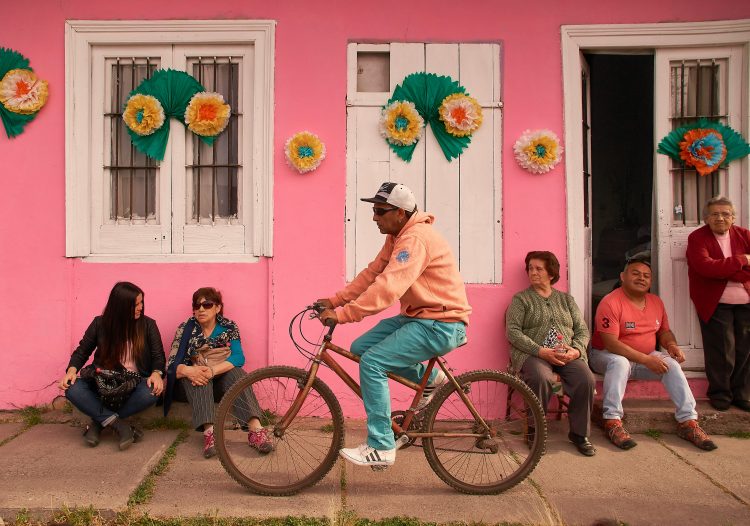The right to social protection was the subject of a new cycle of debates "Chile-EU Counterpoints for the constituent process". Robert Bijl, chairman of the Humanitas Supervisory Council, and Ana Mohedano, deputy secretary general of the Ibero-American Social Security Organisation, agreed that each country’s reality is decisive for generating social transformations.

Foto: Ignacio Amenábar
With two prominent European experts from the European Union’s EUROsociAL programme, the fifth debate took place on Wednesday 4 August within the framework of the “Chile-EU Counterpoints for the constituent process” cycle.
The discussion revolved around the right to social protection, with an analysis of two matters that are currently high up on the public agenda: the proposal for Universal Basic Income or Basic Citizen Income and pension reform, with initiatives that seek to end or put limits on the current AFP system.
The first to speak was the Dutch sociologist, Robert Bijl, chairman of the Humanitas Supervisory Council, an organisation that works to promote labour market insertion and the active life of people with disabilities. “The path to basic income is uncertain as long as all aspects of each country’s reality are not addressed”, said Bijl, who also has a PhD in Sociology and was the deputy director of the Social Cultural Plan Bureau (SCP).
Although he highlighted positive points of its implementation, the expert said he did not agree with Universal Basic Income in the Netherlands, as this could generate greater inequality, considering its robust Welfare System. “You have to apply a balanced approach, giving to those who have the least and not to everyone equally”, he said.
As an alternative, the researcher proposed a system that guarantees income protection and a higher quality of life for the most vulnerable; investment in the public sector with better jobs, with the government offering a basic, social, meaningful and dignified job to all who want one.
“For the Netherlands I do not agree with basic income, but for Chile it is probably a good measure”, he concluded.Solidarity as a basic principle
The deputy secretary general of the Ibero-American Social Security Organisation, Ana Mohedano Escobar, referred to the virtues of a pension system based on the principles of social security, viewed from the perspective of protection of income in old age.
“I think we have to give special importance to the protection of this income, since it is a key indicator in the measurement of a country’s social development because older people are a group that may be at risk of vulnerability”, emphasised Mohedano, who graduated in Law and Political Science and Public Administration and has a Master’s Degree in Direction and Management of Social Security Systems.
She also said that, according to Ibero-American Social Security Organisation data, almost 70% of retired people in Chile receive pensions that are lower than the minimum wage and more than 40% would be below the poverty line,
adding that the idea of solidarity in the Chilean social security system can “contribute enormously to improving the situation of the elderly in the country.”
Asked about which of the European systems is capable of responding to current challenges, Ana Mohedano Escobar indicated that there is no single answer to this question. “The pension systems are rather like tailored suits, which have to be adjusted to the specific situation and reality of a country”, she said.
However, she stressed that a better pension system, in her opinion, must respond to three basic criteria: universality, sustainability and the guarantee of a dignified life.
“We may have lessons to learn from different realities; nevertheless each country, according to its own reality, will have to find the model that best suits it”, said Clarisa Hardy, researcher at the centre for Future Studies, an expert in social policies and former Minister of Development and Planning, who intervened as chairperson.
The event also featured Pablo Navarro, a student at the Faculty of Law of the University of Concepción, who emphasised the fact that “within the structural changes that people have demanded in recent times, a structural reform is that which refers to the social protection system, probably being part of the transformations that will occur in our country, especially considering the framework of the current constituent process that we are experiencing in Chile.”
The aim of these encounters is to generate spaces for discussion on the various experiences of European countries in relation to issues the Constitutional Convention will address, such as economic, social and political challenges.
This activity was carried out within the framework of the Chile-European Union Forum for the constituent process, organised by the European Union Delegation in Chile, together with the EUROsociAL+ Programme, LEXEN, the Inter-Faculty Centre for Law, Economics and Business of the University of Chile, the Centre for Future Studies of the University of Santiago, and the European Studies Programme at the University of Concepción in collaboration with Diario El Mostrador.
Source: Carolina Reyes/Archive. University of Santiago, Chile



